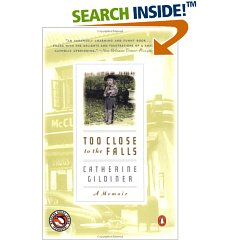Harrumph!

I've been quiet for a while because I haven't had much nice to say about the books I've been reading lately (and everyone's mum told them it was better to say nothing at all in such circumstances).
One of these was Too Close to the Falls by Catherine Gildiner, a memoir of a Catholic girlhood in upstate New York. It had its moments. I learnt that in the fifties, shoe shops had x-ray machines so you could see your bones and a local doctor suggested that using them every time you bought shoes maybe wasn't such a good idea but his opinions were dismissed by the good townfolk because he was known to have socialist tendencies. But it just came across as a bit formulaic: "in this chapter I'll deal with religion", "in this chapter I'll deal with race." A few stories ended up without punchlines when they drifted outside the chapter's theme. It's a Women's Weekly Good Read so it is actually a good read but I wanted more from it. Maybe this was an editing problem??
The other thing I read last week was Before the Frost by Henning Mankell which is about Inspector Wallender of Ystadt in Sweden who is apparently rather good at his job but not much good at life. His 30 year old daughter has just graduated from the police academy and has been posted to his district. She gets to help with an investigation before she starts work (How Famous Five!). It was pretty good as a police procedural in that there was lots and lots about meetings and talking through things. But a lot of it seemed odd and I couldn't work out if this was bad writing, deliberate, a translating problem or a deeper cultural misunderstanding on my part. I never really felt like I got Ingmar Bergman so it could be the last of these.
And I read the Week-end SMH from cover to cover (as usual actually). The essay in the Spectrum part was by some guy who was forced to deal with "Theory" in order to teach creative writing and thought he'd discovered reasons to demolish it as a monolithic whole because it used lots of jargon he didn't understand so it must be meaningless and OF COURSE there's authorial intention so take that, Barthes! Now, I fled the English Department at Uni because, at the time, I couldn't come to terms with Derrida et al (and I still don't like reading postmodernist critiques for fun which is why this blog is pretty well a theory free zone) but this sort of Howardist intellectual revisionism really sticks in my craw because if you roll everything from Leavis on up and chuck it out, you end up with nineteeth-century aesthetics and we'd all be whittering on pointlessly about Shakespearean heroes' tragic flaws. And creating canons of dead white males and not valuing other voices and so on. Harrumph, I say.
It reminded me of David Williamson plonking on a decade ago about how he suddenly understood Literary Criticism in order to write yet another of his plays I haven't seen because it sounded dull (It might even have been called Dead White Males). And the whole "Death Sentence" and "Weasel Words" movement (which I also haven't read so I am extrapolating from book reviews and conversations) complaining about language changing and people not speaking plainly. Academics use language in a technical way to be understood by other practitioners. People don't expect engineers to write deathless prose when designing bridges and they certainly don't assume they're able to tell whether or not bridges will fall down. Just because everyone feels like they have competence in reading novels doesn't mean they're qualified to dismiss the academic practice of criticism. (Not that I want to join in either.)
Harrumph I say again!

0 Comments:
Post a Comment
<< Home